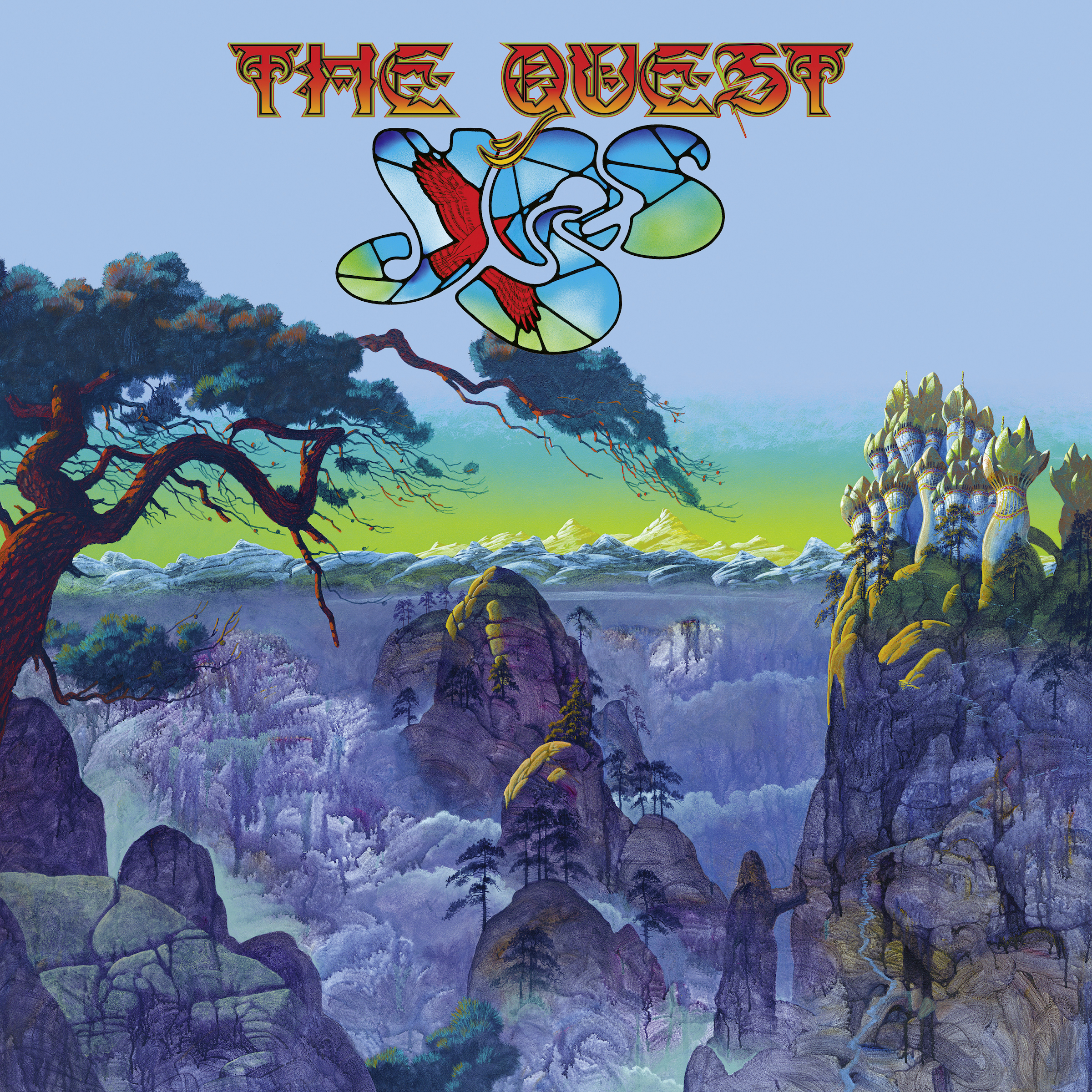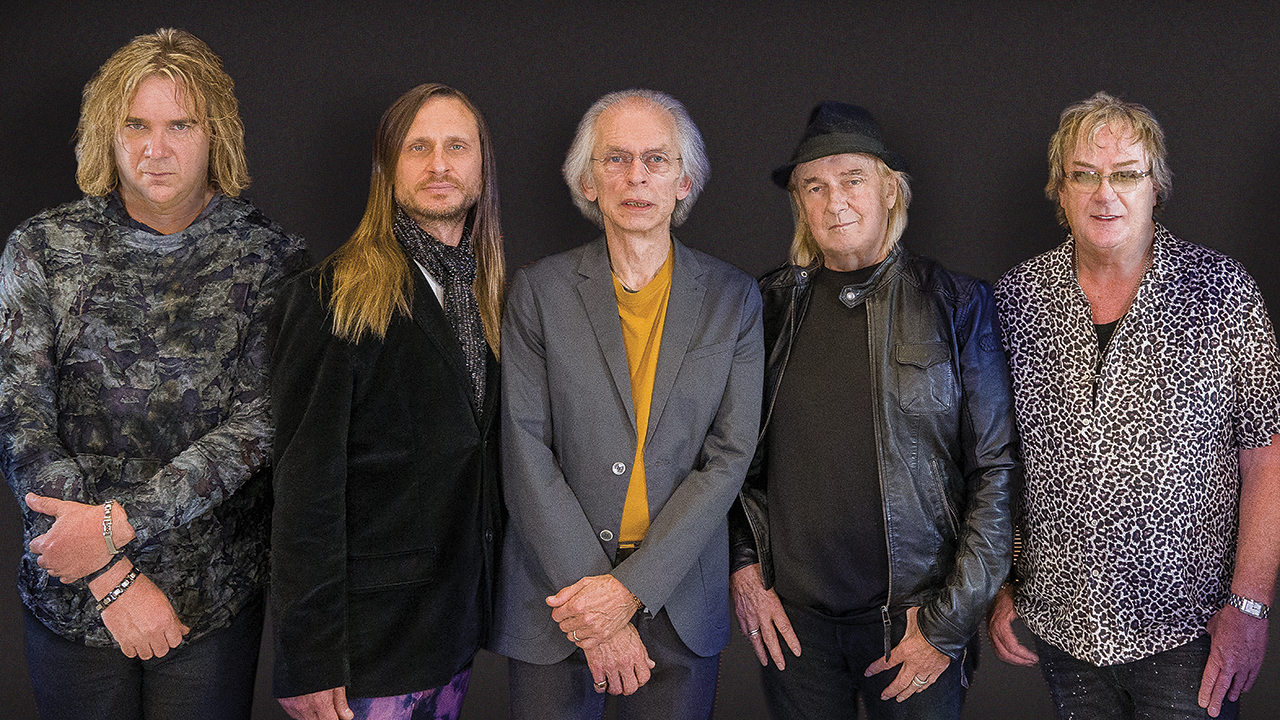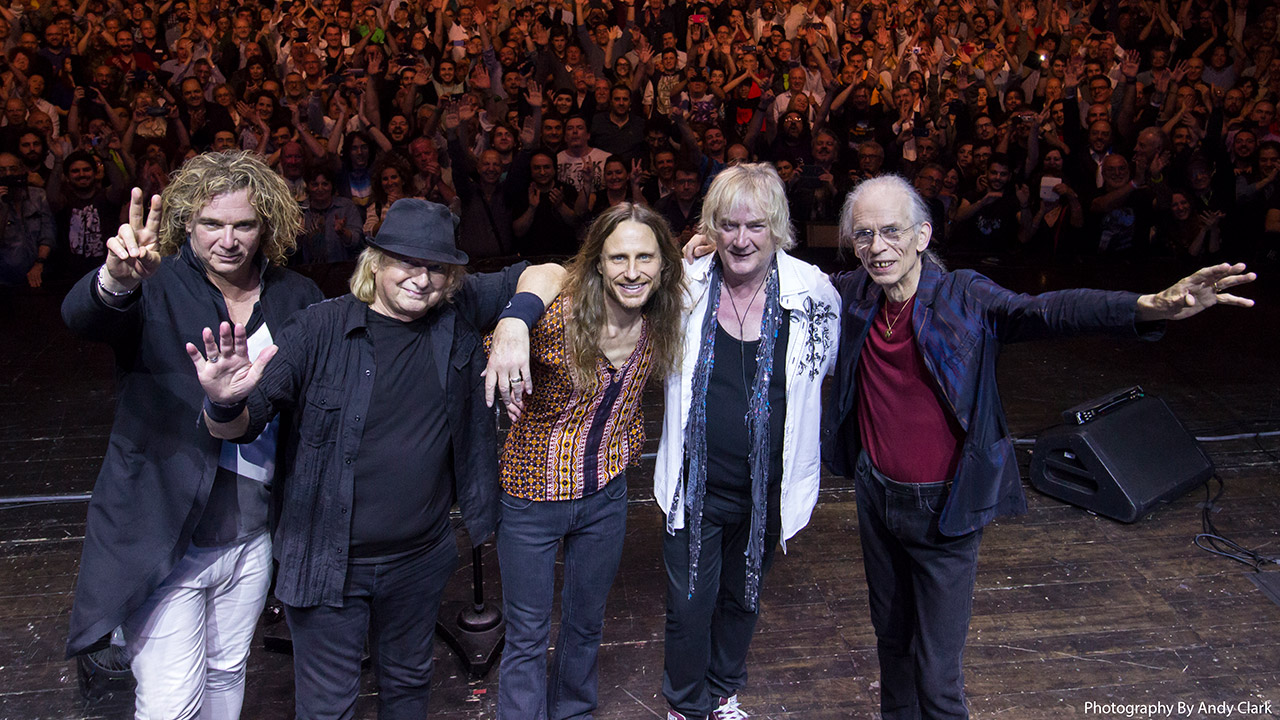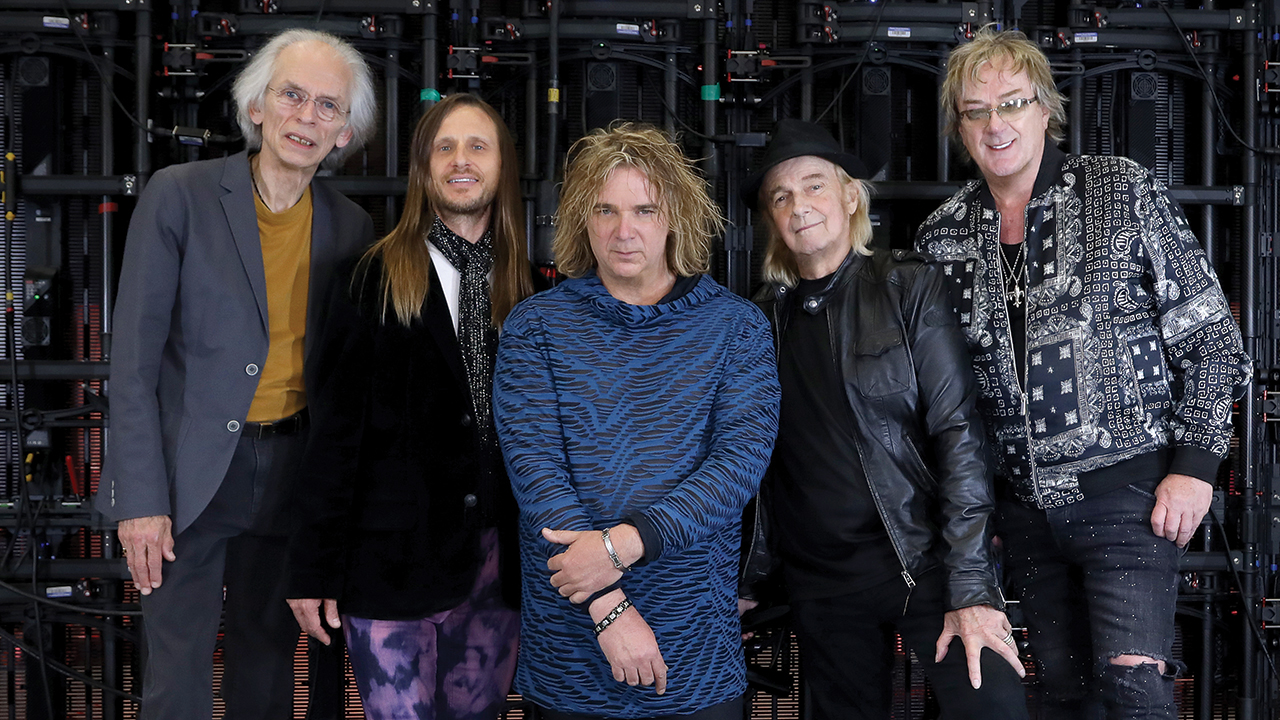Among the most fascinating aspects about Yes is the band’s perpetual state of transience. De facto leaders have come and gone as each chapter of their saga unfolds. Following the loss of co-founding bass player Chris Squire in 2015, Steve Howe has emerged as the group’s latest alpha male. Now into a third spell as a player, the guitarist produced and pretty much drove the bus as the post-Squire incarnation of the band laid down their inaugural statement – their 22nd studio album.
Howe’s mission with The Quest was simple. “I wanted to help Yes reinvent itself,” he explains. The 1990s and beyond, as Howe readily admits, “was a bit of a spotty period of Yes. You take the 1970s – need I say more? And you take the 1980s – again, need I say more? But the 90s was a mixed bag. I don’t know how successful I’ve been, but I was trying to build a new model of Yes.”
Cards on table time: this writer has interviewed Howe many times, both as
a part of Yes and during his heady days with Asia, and Howe can be a bit of a crotchety old so-and-so. As a musician’s musician he would rather play music than talk about it. However, today there’s something evangelical about the guy.
It’s a suggestion that Geoff Downes, the keyboardist who knows Howe very well from those Asia times and his own multiple tenures with Yes, is in firm agreement with.
“Steve is galvanised,” enthuses Downes with a wide smile. “The chains are off, he’s a man unleashed. At 74, I don’t know how he does it, but Steve is very motivated. It [the role of leader] wasn’t exactly bestowed upon him; it’s just something he has stepped up to.”

Like every other band to make an album over the past two years, Yes faced an additional foe. Along with the band’s singer of almost a decade’s standing, Jon Davison, Howe first got together to compare song ideas in the autumn of 2019, but under lockdown Davison was largely stuck in Barbados while drummer Alan White and bass player Billy Sherwood remained at their homes in Seattle and Los Angeles respectively. With Howe and Downes both based in England, there were times when groups of one or more could visit the studio they called ‘Yes HQ’ in Sussex, although for the most part the album was made in isolation.
“The process of making The Quest was like no other Yes album, but it was also quite fun,” Howe confides. “Artistically and creatively speaking, it [Covid] didn’t block us at all.”
“It wasn’t too difficult actually, because Downes Braide Association [his project with singer Chris Braide] also work remotely,” Downes agrees during a separate Zoom conversation. “One of the positives of the pandemic is that, for bands of a certain maturity, being together in a studio and thrashing it out is no longer mandatory. We’re used to trading files and ideas.”
The pair both expect additional levels of scrutiny given that The Quest is the first Yes album to be made without Squire.
“Yeah, certainly, we can’t avoid that fact,” the guitarist nods calmly. “There was a real need for Billy [Sherwood, Chris’ replacement] to step up, and he did that. You can hear him on [album opener] The Ice Bridge. With the way that we balance the band, the bass is a very key instrument and we hope that we have brought credit to Chris and his legacy.”
Both cheerfully acknowledge that The Quest had to offer a marked improvement over its predecessor, 2014’s Roy Thomas Baker (Queen, Journey, Hawkwind)-produced Heaven & Earth, which was far too lacklustre for its own good.
“I would agree with that completely,” responds Howe before breaking into a smile.
“I won’t keep this a secret any longer – I said to Roger [Dean, illustrator]: ‘The sleeve is better than the record.’ Heaven & Earth was a troublesome record to make, and that’s because the producer is responsible for more than the way the record sounds; they control the atmosphere, the [inter-band] feeling and the progression and development of the music.”
“We can’t deny that Heaven & Earth was not well received,” Downes agrees. “It was a linear type of album; it lacked the dynamics of this one.”
“We made The Quest in a fruitful and happy way, which wasn’t true of Heaven & Earth,” Howe elaborates. “The same applies to Fly From Here [2011], Magnification [2001], The Ladder [1999] and Open Your Eyes [1997]. In the past there have been a lot of headaches around the making of Yes records; I wanted to dispel that.”

The Quest certainly doesn’t sound like the handiwork of a band plagued by in-fighting or self-doubt, even if its promotion began with a massive own goal. Upon the unveiling of a first YouTube song, the three-part suite The Ice Bridge, they were forced to add a belated credit for Francis Monkman due to similarities with the former Sky and Curved Air keyboardist’s own 1978 piece The Dawn Of An Era.
“That caused a certain amount of contention,” sighs Downes, who’d discovered the basic song idea an old work tape and mistakenly took it for something of his own, originally co-authoring it with Davison, “but having said that I think we created a very powerful piece of music.”
The Ice Bridge is one of several songs recorded with a 47-piece orchestra, and if readers listen carefully enough, in keeping with its theme of global warming, there’s a literal moment of ice-breaking.
“Yeah, that was one of my kinky ideas,” Howe chuckles. “We found this sound of an iceberg breaking up and everybody liked it, so it got used. I’m not shy of sound effects.”
In a practical sense, the task of adding orchestration to songs such as Dare To Know and Minus The Man wasn’t easy, given that the classical musicians were thousands of miles away in Macedonia, and recording was slated to last a single day. It helped that Yes had implicit trust in the scores supplied by their arranger Paul K Joyce.
“This is not an orchestral album,” Howe stresses. “We used the orchestra for added augmentation. Dare To Know has a 16-bar section where the band stops playing and the orchestra continues with the theme, and that provides a great moment.”
In stark contrast to its one-dimensional predecessor, the album’s sweeping palettes of light and shade offer nods to the band’s past.
“One thing I didn’t want was a pastiche of something we had done before,” says Howe.
Downes agrees: “If people are expecting Part Two of Close To The Edge, well it’s not that, but there are elements of 1970s Yes. I used a lot of Hammond organ, acoustic and electric piano, Minimoogs and a Mellotron, but in many ways it’s also an album that sits in quite a modern setting.”
The two-CD set is broken down into eight tracks that comprise the ‘main’ album, complemented by a further three presented on a separate disc. However, Howe becomes a little agitated by Prog’s use of the term ‘bonus tracks’. “Those are tainted words,” he insists. “I cannot overstate the fact that those three songs are not rejects or throwaways.”
In fact, another of its finest tracks, the Davison/Howe-penned Sister Sleeping Soul, falls into the ‘bonus’ category.
“It’s by no means inferior, it’s a fresh and beautifully constructed song,” agrees Howe. “I’m using a Portuguese guitar, which places it in the area of Wonderous Stories [from 1977’s Going For The One] or Your Move [The Yes Album, 1971].”
So it’s fitting that The Quest marks Yes’ debut for InsideOut, a real progressive rock label for a real progressive rock band.
“This is where we belong,” Howe enthuses. “Thomas Waber [label co-founder] is hard to please, but the great thing about his company is that they give a shit. Just like us, they’re not farting around.”

Steve Howe has been a part of Yes since replacing Peter Banks for the watershed set The Yes Album, logging up some 38 years of service in total. Having joined briefly with fellow former Buggles conspirator Trevor Horn for the controversial Drama, leaving and rejoining with Fly From Here, Downes is now into an 11th year on board. Regardless, within the 2021 line-up original members are conspicuous by their absence. Without sounding glib… does it even matter?
“Well, I like to think that we still have contact with Bill Bruford [co-founding drummer] and Tony Kaye [keyboardist], and I’m still friendly with Jon [Anderson, vocalist] and the other guys who are around, but there’s a limited number of original members sharing the planet with us at the moment,” Howe responds after a moment’s pause. “And I definitely think that there is support for a band that carries the name forward.”
Howe admits to occasionally meeting fans that tell him the band shouldn’t be continuing without Chris Squire.
“There will always be naysayers, and to a degree I understand where those thoughts come from,” he states. “We are sticking our necks out with The Quest; it isn’t a given that it will be successful, but I’m hopeful that we can cross that bridge and reignite [the belief of] some of those fans.”
In the grand scheme of things, is it important that Yes should continue?
“Well, the alternative option is that it doesn’t – that’s the reality, in black and white terms,” Howe responds. “Keeping things going doesn’t come without challenges, but we’re holding onto the gauntlet and we have a huge respect for the original members.”
Downes: “I see no reason why the band shouldn’t continue. Maybe some people think we should just bash out the old songs and behave like a circus act, but I disagree. After 53 years we are still putting out new albums. I believe that Yes still have a lot to offer.”
Right now, with a record as satisfying as The Quest to show the world, Planet Yes seems like a pretty good place to be.
“Well, we’re making it so,” Howe replies sagely. “The challenge is to meet the expectations of others, and I still feel that there’s a place for Yes. The band has such a fantastic history and we are doing our utmost to carry that into the future.”
Yes don’t resume touring in the UK until next summer, with a set featuring the best moments from The Quest and some catalogue gems, plus an in-its-entirety revision of their seventh album, Relayer. Having spent so long locked away, Downes suspects it will be “strange” to hit the boards again.
“We’ve had a couple of years of gardening leave, but the band are ready to go and anxious to begin the next chapter,” he concludes. “The Quest isn’t the last album you’ll hear from us. We’re already talking about the next one.”
This article originally appeared in issue 124 of Prog Magazine.

